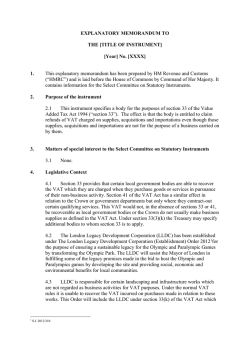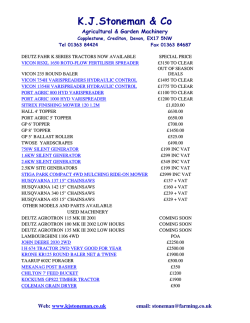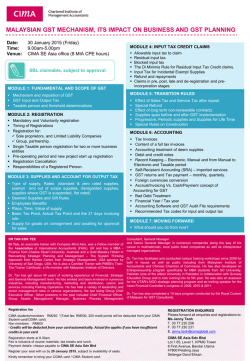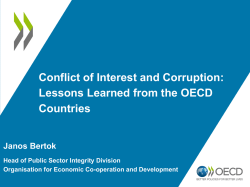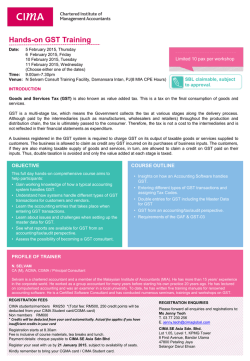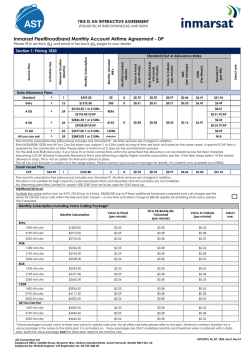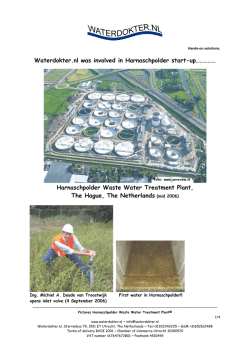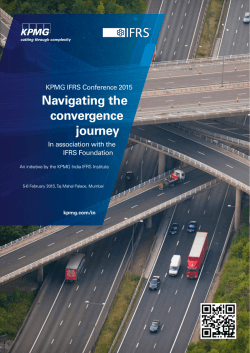
New Global VAT/GST Regime Coming for Cross-Border
New Global VAT/GST Regime Coming for CrossBorder Sales of Services and Intangibles January 29, 2015 No. 2015-06 Businesses that sell services and intangible goods to other businesses or consumers across international borders may have to change the way they collect VAT or GST on these transactions if countries around the world adopt the OECD’s International VAT/GST Guidelines. Some countries have already changed their tax regimes to more closely resemble the OECD’s guidelines and others may do so soon. If these guidelines are adopted by most OECD countries, they could significantly increase businesses’ compliance burden, most notably in registration, tax remittance and audits. Businesses may also have to make substantial changes to their information systems to comply with new rules proposed by the OECD’s guidelines. Canadian companies providing services and intangibles into countries that have already adopted aspects of the OECD’s system, such as the European Union countries, should assess their potential tax obligations if they have not already done so, particularly if they are selling services and intangible goods to consumers. The compliance burden and systems changes associated with registering and accounting for VAT in these countries could be significant. OECD proposes global standard The OECD wants its draft guidelines to become a global standard that will prevent both double taxation and unintended non-taxation of international transactions that can result from inconsistent application of national VAT systems to international trade. The guidelines will provide guidance to governments for evaluating and developing the legal and administrative framework of their VAT systems. Businesses who may be affected by the OECD’s proposals have an opportunity to voice their views. The OECD is accepting comments on its recent business-to-consumer proposals until February 20, 2015. KPMG observation The OECD provides guidance on how VAT/GST should apply to international trade but its guidelines are only “soft law” — they do not oblige countries that endorse them to actually follow them, nor do they provide businesses with any enforceable rights. Nevertheless, several countries have already introduced measures that are broadly similar to those the Page 1 of 5 TaxNewsFlash – Canada New Global VAT/GST Regime Coming for Cross-Border Sales of Services and Intangibles January 29, 2015 No. 2015-06 OECD is proposing for business-to-consumer sales. Most notably, member countries of the European Union are requiring non-resident suppliers of telecommunications, broadcasting and electronic services to register and account for VAT as of January 1, 2015. Other countries that have regimes similar to the OECD’s guidelines include Norway, South Africa and Iceland. Some of the features of these systems include simplified registration, reporting and remittance procedures as well as registration thresholds and input tax credit restrictions. Other countries are considering the issue and can be expected to introduce measures in the future, particularly if the OECD’s draft guidelines on business-to-consumer sales are approved by the OECD and endorsed in a subsequent OECD Global Forum on VAT. Whether the Canadian government will make changes in this area and what those changes might be remains to be seen. However, a precedent has been set by the actions of other countries and the proposals outlined in the OECD’s draft guidelines. Business-to-business trade The first three chapters of the OECD’s guidelines concern VAT neutrality and VAT on crossborder business-to-business (B2B) trade in services and intangibles. The first set of guidelines ensure that the burden of VAT falls on private consumers and not businesses, thereby ensuring neutrality between domestic and foreign businesses. The second set of guidelines ensures that cross-border B2B trade in services and intangibles is taxed only in the country of the recipient but recognizes that in certain limited circumstances it could be more appropriate to use specific rules that apply tax on a basis other than the customer’s location. The guidelines also state that where a customer has establishments in more than one jurisdiction, tax should accrue to the country in which the establishment using the service or intangible good is located. This rule would also apply in branch-to-branch transfers of externally sourced services and intangible goods. The commentary to the B2B guidelines recommends that businesses reverse charge or selfsupply for any tax due on cross-border supplies of services and intangible goods. In other words, these businesses would remit the tax to the government themselves rather than paying it to the supplier of the services or intangible goods. As a result, the supplier should not be required to register and account for any tax due in the customer’s country. Canada was among the countries that endorsed these guidelines as a global standard at the second meeting of the OECD Global Forum on VAT in April 2014. KPMG observation It remains to be seen whether the Canadian government will review and evaluate its current GST/HST framework within the context of the OECD’s guidelines for B2B trade. Page 2 of 5 TaxNewsFlash – Canada New Global VAT/GST Regime Coming for Cross-Border Sales of Services and Intangibles January 29, 2015 No. 2015-06 While the GST/HST generally follows these guidelines, there may be some cases where it does not. For example, businesses that are not resident in Canada and not registered for GST/HST may incur significant amounts of GST/HST making taxable purchases in Canada that they cannot recover as input tax credits, unlike businesses that are Canadian resident GST/HST registrants. A significant development in this area is the recommendation to tax cross-border interbranch transfers of externally sourced services and intangible goods in the country of the branch that is using the service or intangible good. The Canadian GST/HST already applies to these transfers. Many countries however, do not apply VAT to these transfers. Canadian businesses with branches in other countries, most notably financial institutions, should watch for possible future changes in these countries. Business-to-consumer trade The OECD released a discussion paper on December 18, 2014 on two new elements of the guidelines. These two elements relate to the place of taxation for business-to-consumer (B2C) supplies of services and intangibles and provisions to support the application of the guidelines in practice. The OECD is inviting comments on this discussion paper until February 20, 2015. The draft B2C guidelines recommend three general rules: Rule 1 – On-the-Spot Supplies On-the-spot supplies refers to supplies that are physically performed in the presence of both the supplier and customer and are consumed at the time and place they are performed. Examples include restaurant meals, personal services and cultural and sporting events. The recommended place of taxation for these supplies is the place of performance. Rule 2 – Other Supplies This rule covers supplies that are consumed on an on-going basis, at a time later than the time of performance and most notably, those supplied from a remote foreign location. Examples include professional and financial services, telecommunications and on-line supplies of software and digital content. For these supplies, the recommended place of taxation is the usual residence of the customer, which is where the customer regularly lives or has established a home. The guidelines state that the most effective and efficient way to collect VAT on cross-border B2C supplies of services and intangibles is to require non-resident suppliers to register and account for VAT in the country of the customer. The guidelines acknowledge that it may be burdensome and complex for non-resident suppliers to comply with such obligations and for tax administrations to enforce and administer them. To address these challenges, the guidelines recommend that countries consider simplified registration and compliance regimes Page 3 of 5 TaxNewsFlash – Canada New Global VAT/GST Regime Coming for Cross-Border Sales of Services and Intangibles January 29, 2015 No. 2015-06 to facilitate voluntary compliance by non-resident suppliers and that countries enhance their enforcement capacity through increased international cooperation. Rule 3 – Specific Rules The guidelines recognize that the general rule of usual residence of the customer and the rule for on-the-spot services may not give an appropriate result in all cases. As such, certain services may require their own specific rules. The guidelines provide criteria for evaluating whether such specific rules are warranted. An example given is internet access in a café or hotel lobby. In this case, the general rule based on the usual residence of the consumer would not be sufficiently accurate. As such, the actual location of the consumer at the time of the supply could be used to determine the jurisdiction that would tax the transaction, similar to Rule 1 above. KPMG observation Recently, governments have been paying more attention to the application of VAT to cross-border B2C supplies of services and intangibles. This issue was included in the OECD project on Base Erosion and Profit Shifting (BEPS), which concluded in a report that “the collection of VAT in business-to-consumer (B2C) transactions is a pressing issue that needs to be addressed urgently to protect tax revenue and to level the playing field between foreign suppliers relative to domestic suppliers.” The move to require non-resident suppliers of remotely delivered services and intangible goods to register and account for VAT in the country of the customer represents a significant shift in the way in which such supplies are taxed from a VAT/GST perspective. The implementation of these rules on a global basis will bring about significant challenges for businesses and will only be feasible, in our view, if the rules are applied globally in a clear and consistent manner, and the registration and compliance obligations imposed on businesses are simple and reasonable. It will also be extremely important for countries adopting this approach to clarify that a VAT/GST registration by a non-resident B2C vendor, of itself, does not give rise to a permanent establishment for corporate income tax purposes. The Canadian government participated in the development of the draft B2C guidelines and is currently considering how to ensure the effective collection of GST/HST on e-commerce sales to Canadian consumers by foreign-based vendors. Whether it will announce any proposals in the near future remains to be seen. Provisions supporting the guidelines The discussion paper also presents draft supporting provisions which are intended to complement the draft guidelines. Annex 3 of the paper outlines possible features of a simplified registration and compliance regime for non-resident suppliers of B2C services and Page 4 of 5 TaxNewsFlash – Canada New Global VAT/GST Regime Coming for Cross-Border Sales of Services and Intangibles January 29, 2015 No. 2015-06 intangibles. Topics covered include registration, invoicing, returns, payments, input tax recovery and use of third parties. The OECD recognizes that various measures such as simplified registration, returns and payment procedures could encourage compliance by non-resident suppliers and outlines some of the key features of these measures. However, the paper also notes that a simplified registration and compliance regime may prohibit non-resident businesses registered under such a regime from claiming input tax credits. The paper notes that these simplified procedures are recommended mainly for B2C supplies — the guidelines recommend the reverse charge mechanism for cross-border B2B supplies, as noted above. Because suppliers would zero-rate B2B supplies under this mechanism, they would need to distinguish B2C from B2B supplies. Download KPMG’s Tax Hub Canada app KPMG’s Tax Hub Canada app provides timely and convenient tax news to your iPhone, iPad, BlackBerry and Android. Download now. We can help Your KPMG adviser can help you assess the potential effect of the OECD’s VAT/GST Guidelines on your business, and point out ways to take advantage of any benefits arising from the guidelines or help mitigate their impact. For more details on the guidelines and their potential impact, contact your KPMG adviser or John Bain, National Leader – Indirect Tax Services (Toronto), Rainer Nowak (Toronto) or any other member of our Canadian Indirect Tax team. Information is current to January 28, 2015. The information contained in this TaxNewsFlash-Canada is of a general nature and is not intended to address the circumstances of any particular individual or entity. Although we endeavour to provide accurate and timely information, there can be no guarantee that such information is accurate as of the date it is received or that it will continue to be accurate in the future. No one should act upon such information without appropriate professional advice after a thorough examination of the particular situation. For more information, contact KPMG’s National Tax Centre at 416.777.8500. KPMG LLP, an Audit, Tax and Advisory firm (kpmg.ca) and a Canadian limited liability partnership established under the laws of Ontario, is the Canadian member firm of KPMG International Cooperative (“KPMG International”). KPMG member firms around the world have 155,000 professionals, in 155 countries. The independent member firms of the KPMG network are affiliated with KPMG International, a Swiss entity. Each KPMG firm is a legally distinct and separate entity, and describes itself as such. KPMG's Canadian web site is located at http://www.kpmg.ca/ © 2015 KPMG LLP, a Canadian limited liability partnership and a member firm of the KPMG network of independent member firms affiliated with KPMG International Cooperative (“KPMG International”), a Swiss entity. All rights reserved. The KPMG name, logo and “cutting through complexity” are registered trademarks or trademarks of KPMG International. Page 5 of 5
© Copyright 2026

